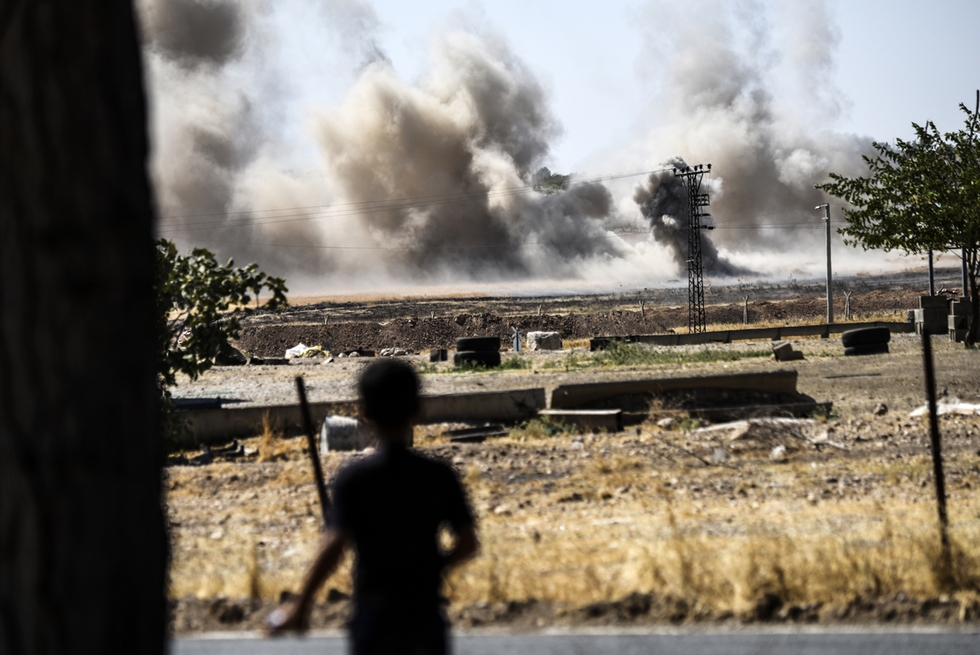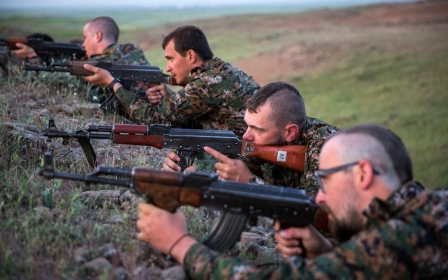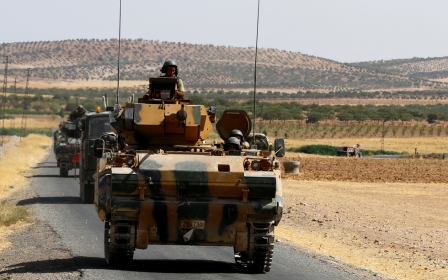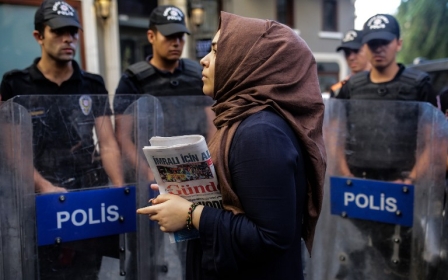Turkey’s high-stakes game: New friendships and a plunge into Syria's war

The tectonic plates are shifting in Syria, in large part due to Turkey’s deepening and changing involvement in the conflict. Those shifts began with Ankara’s rapprochement with Moscow this summer, following tensions resulting from Turkey’s downing of a Russian warplane over its border with Syria last year.
In tandem, Ankara has expressed its desire to improve relations with the Syrian regime’s other backers Iran and Iraq, and most strikingly with the regime itself - a major development given Turkey’s hitherto strident opposition to Syrian President Bashar al-Assad.
Ankara’s rapprochement with Moscow has been widely interpreted as driven mainly or solely by the effects on Turkey of Russian economic sanctions following the downing of the warplane. However, the Kurdish issue - namely Syrian Kurdish territorial gains, and the resumption and intensification of the insurgency by Turkish Kurds - is an important factor that has been overlooked.
Ankara has not expressed this as a motivating factor, but subsequent developments suggest it must have weighed heavily on its strategic considerations.
Turkey has long voiced concern at Kurdish territorial gains in Syria, opposition to Syrian Kurds’ declarations of autonomy, and anger at the support they are receiving from the US. Meanwhile, Damascus and its allies have long condemned Turkish involvement in the conflict.
Assad turns on Syrian Kurds
However, for the first time since the Syrian revolution began in 2011, the Assad regime has turned its guns on the mainly Kurdish YPG militant group, which Syrian rebels had long accused of collaborating with the regime.
In addition, Damascus and its allies have been silent as the Turkish military has entered northern Syria to take on the Kurds (accused by Ankara of aiding the Kurdish insurgency in Turkey) as well the Islamic State (IS), which has stepped up its attacks in Turkey. Such direct intervention would have previously caused uproar as a violation of Syrian sovereignty.
As such, Turkish-Russian rapprochement seems to have entailed Ankara toning down its hostility toward Assad, in return for him turning on the YPG, and for the pro-Assad camp’s acceptance of Turkey’s direct - but not indefinite - entry into Syria.
This should not be interpreted by Syrian rebels as beneficial to them in their fight against Assad. Rather, this suits the Syrian president because Turkey’s powerful military can weaken forces that hold large swathes of territory outside his control (it has already pushed back Kurdish forces), while not threatening his forces or those of his allies. Ankara is likely to have given private assurances of that, at least to Moscow and perhaps Tehran.
Last week’s meeting between Turkey’s president and that of Iraqi Kurdistan, as well the Turkish foreign minister’s surprise visit to Tehran, may have been at least partly an attempt by Ankara to ensure that the Iraqi Kurds and Iranians are on side.
Turkey has carried out shrewd calculations with regard to its entry into Syria, which so far appear to be paying off. It has managed to isolate the Syrian Kurds, who presently lack significant allies on the ground, whether from the pro-Assad or anti-Assad camps, or from IS.
Turkey wins diplomatic pass
The Turks know that the US, while calling for a halt to fighting between them and the Kurds, will not apply pressure on Ankara to do so, particularly not after Vice President Joe Biden’s recent fence-mending visit, during which he warned the Kurds that they risked losing US support if they did not withdraw to the east of the Euphrates river. Similarly, Turkey is too important a trade partner for the Iraqi Kurds to back their ethnic kin in Syria.
Turkey has managed the impressive feat of entering Syria without open condemnation from opposing sides inside Syria, or from other regional powers on either side of the conflict. Its mission will be popular domestically given public demands to hit back at increasing attacks by IS and Turkish Kurds. The military advances already made in Syria will certainly play well at home.
However, Turkey’s manoeuvres are fraught with difficulty, not least the prospect of getting dragged into Syria for longer than it intends. After all, Russia did not intend to still be directly involved militarily when it began its air campaign last year. Moscow announced the withdrawal of most of its forces earlier this year, but is more involved now than ever.
Ankara has not set a timeframe for its operation. If it drags on and incurs heavy casualties - not just among the military (which has already suffered casualties), but among civilians in Turkey from terrorist attacks - this may adversely affect public backing at a time of economic difficulty and political uncertainty.
Syrian rebels in the cold
Suspicions and concerns were raised within the anti-Assad camp when Ankara announced its desire to normalise relations with Damascus. Those suspicions and concerns may be further heightened now if Syrian rebels and Turkey’s Arab allies see it as burying the hatchet with the regime and its backers.
After all, Turkey is in Syria to take on IS and the Kurds, but not the regime, which it had consistently - and rightly - described as the root of the conflict. This highlights a major problem of Ankara’s new desire to improve ties with countries in the region with which it has had tensions in recent years.
Rapprochement with Israel risks undermining Turkey’s championship of the Palestinian cause. Closer ties with Iran risks angering Saudi Arabia. Rapprochement with Russia risks upsetting the Syrian opposition. Rapprochement with Egypt would risk alienating Qatar.
In a region with so many fierce divisions, trying to please everyone may end up having the opposite effect - a balancing act that, in the current regional climate, seems almost impossible.
- Sharif Nashashibi is an award-winning journalist and analyst on Arab affairs. He is a regular contributor to Al Arabiya News, Al Jazeera English, The National, and The Middle East magazine. In 2008, he received an award from the International Media Council "for both facilitating and producing consistently balanced reporting" on the Middle East.
The views expressed in this article belong to the author and do not necessarily reflect the editorial policy of Middle East Eye.
Photo: On 1 September 1, 2016 in the Turkish-Syrian border town of Karkamis, in the southern region of Gaziantep, a boy looking at smoke rising close to the Syrian-Turkish border town of Jarabulus. (AFP)
This article is available in French on Middle East Eye French edition.
New MEE newsletter: Jerusalem Dispatch
Sign up to get the latest insights and analysis on Israel-Palestine, alongside Turkey Unpacked and other MEE newsletters
Middle East Eye delivers independent and unrivalled coverage and analysis of the Middle East, North Africa and beyond. To learn more about republishing this content and the associated fees, please fill out this form. More about MEE can be found here.





